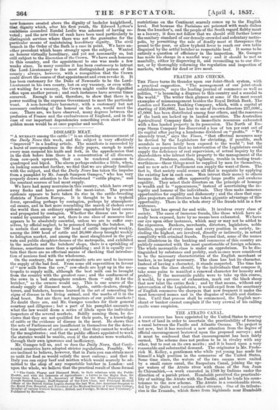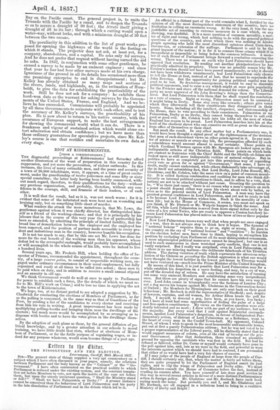THE ATRATO CANAL.
A commissioN has been appointed by the United States to survey a tract of land in order to ascertain the practicability of forming a canal between the Pacific and Atlantic Oceans. The project is not new, but it has received a new attention from the degree of official encouragement bestowed upon the proposed surveys ; and. it must be confessed that that encouragement has been fairly earned. The scheme does not profess to be in rivalry with any other, but to rest on its own merits ; and it is based upon a very reasonable and substantial demand. The originator is Mr. Frederick M. Kelley, a gentleman who while yet young has made for himself a high position in the commerce of the United States. Some time since, the waters of the two oceans were united by a small canoe canal, the Raspadura Canal, joining the upper waters of the Atrato river with those of the San Juan de Chirambira,—a work executed in 1788 by Indians under the direction of a parish priest. Humboldt perceived the practicability of uniting the Atrato with the Pacific, and he lends his countenance to the new scheme. The Atrato is a considerable river, fed by the Quito and various other streams. One of its tributaries is the Truando, which flows from highlands near Humboldt Bay on the Pacific coast. The general project is, to unite the Truando with the Pacific by a canal, and to deepen the Truando so as to secure a draught of 30 feet ; the Atrato itself giving a draught of 58 to its bar ; through which a cutting would open a water-way, without locks, and with a minimum draught of 30 feet between the two oceans.
The peculiarity in this addition to the list of great works proposed for opening the highways of the world is the footing on which it stands. The projector does not ask, at least yet, for a company, shareholders, and a capital. He asks only for surveys. And he does not prefer that request without having earned the aid he asks. In 1852, in conjunction with some other gentlemen, he caused a survey to be made by an eminent engineer ; and since that year he has had four other surveys made at his own charge. Ignorance of the ground in all its details has occasioned more than one promising enterprise to end in disappointment ; but Mr. Kelley has already obtained so many maps and sections of the rivers, lands, and highlands, as, in the estimation of Humboldt, to give the data for establishing the practicability of the work. Still he does not ask for a company : he exhibits these hard-won data as the warrant for asking surveys by the Governments of the United States, France, and England. And we believe he has succeeded. Commissions will probably be appointed by all three Governments to cotiperate with each other, and to test the accuracy of Mr. KeLley's surveys, the practicability of his plan. He is now about to return to his native country, with the assurance of European support, to make the last arrangements for showing the commercial world what it can do. There is a frankness and vigour of sustained action which would alone extort admiration and obtain confidence ; but we have more than those ordinary guarantees for speculative projects, since Mr. Kelley's course is one that rectifies and ascertains its own data at every stage.



































 Previous page
Previous page